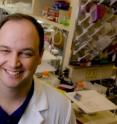Protein inhibitor helps rid brain of toxic tau protein
Inhibiting the protein Hsp70 rapidly reduces brain levels of tau, a protein associated with Alzheimer's disease when it builds up abnormally inside nerve cells affecting memory, neuroscientists at the University of South Florida found. The study is reported online today in the Journal of Neuroscience. "Now that we've discovered that targeting the chaperone protein Hsp70 can clear tau, it could be helpful in finding more effective drugs for Alzheimer's disease," said the study's senior author Chad Dickey, PhD, assistant professor of molecular medicine who works out of the Byrd Alzheimer's Institute at USF Health "The therapeutic strategy may also be applicable to other neurodegenerative diseases involving Hsp70, such as Huntington disease, amyotrophic lateral sclerosis (ALS), and some cancers."
Hsp70 is a one of several "chaperone" proteins that supervises the activity of tau inside nerve cells. The normal function of tau is to support the structure of nerve cells, much like the skeleton provides a scaffold to support the body. Tau is inside nerve cells, while another hallmark protein associated with Alzheimer's, beta amyloid, is outside the neurons.
Working with researchers at the University of Michigan, the USF team tested the effects of several compounds on Hsp70 in cell models and brain tissue from mice genetically modified to develop the memory-choking tau tangles. Some compounds activated Hsp70, and others were Hsp70-inhibitors.
One of the more effective Hsp70-inhibitor drugs the researchers discovered was a derivative of methylthioninium chloride, or Rember™, the first experimental medication reported to directly attack the tau tangles in patients with Alzheimer's disease. Rember™ was heralded as a major development in the fight against Alzheimer's when results in early clinical trials were announced last year at the International Conference on Alzheimer's disease.
But Rember™ and its derivatives do have some inherent problems; they're not very potent so effective therapy would require fairly high doses, Dickey said.
"The drug does help prevent the protein (tau) from clumping together, but that in itself doesn't mean it's actively getting rid of the toxic tau," he said. "Now that we know Hsp70 is a target of Rember™, we can develop similarly-acting drugs that will more specifically target this chaperone protein in affected areas of the brain, resulting in fewer side effects."
The USF researchers originally thought activating Hsp70 would direct the chaperone protein to decrease the tau gone bad -- preventing tau from stacking up into tangles inside cells involved in memory and destroying them. But instead of restoring tau to its normal supportive function, activating Hsp70 actually led to tau's preservation and even more accumulation, Dickey said. "Basically we think the chaperone binds to the tau, and somehow in the process of trying to fix things decides to keep holding onto tau when it shouldn't. So, activating Hsp70 is not necessarily what we want to do; we ultimately want to inhibit Hsp70 to promote the release or clearance of tau …to kill the bad tau."
Dr. Dickey emphasizes that problems with Hsp70 alone do not cause Alzheimer's. It likely develops from a convergence of various factors in the brain, he said, including deposits of the other featured Alzheimer's protein beta amyloid, or a genetic defect; disruption of cell signaling; a breakdown in the neuron's support structure, and then accumulation of tau into the memory-choking tangles.
Dr. Dickey's team at USF focuses on how to manipulate with drugs or gene therapy the chaperone proteins that regulate tau's fate – determining whether it's preserved or cleared from the brain. The University of Michigan team works on identifying and developing compounds that may be effective against Alzheimer's disease and other tauopathies.
Source: University of South Florida Health
Other sources
- Protein Inhibitor Helps Rid Brain Of Toxic Tau Proteinfrom Science DailyWed, 30 Sep 2009, 18:28:11 UTC
- Protein inhibitor helps rid brain of toxic tau proteinfrom Science BlogWed, 30 Sep 2009, 2:28:22 UTC
- Protein inhibitor helps rid brain of toxic tau proteinfrom Science BlogTue, 29 Sep 2009, 21:56:13 UTC
- Protein inhibitor helps rid brain of toxic tau proteinfrom PhysorgTue, 29 Sep 2009, 21:35:17 UTC
